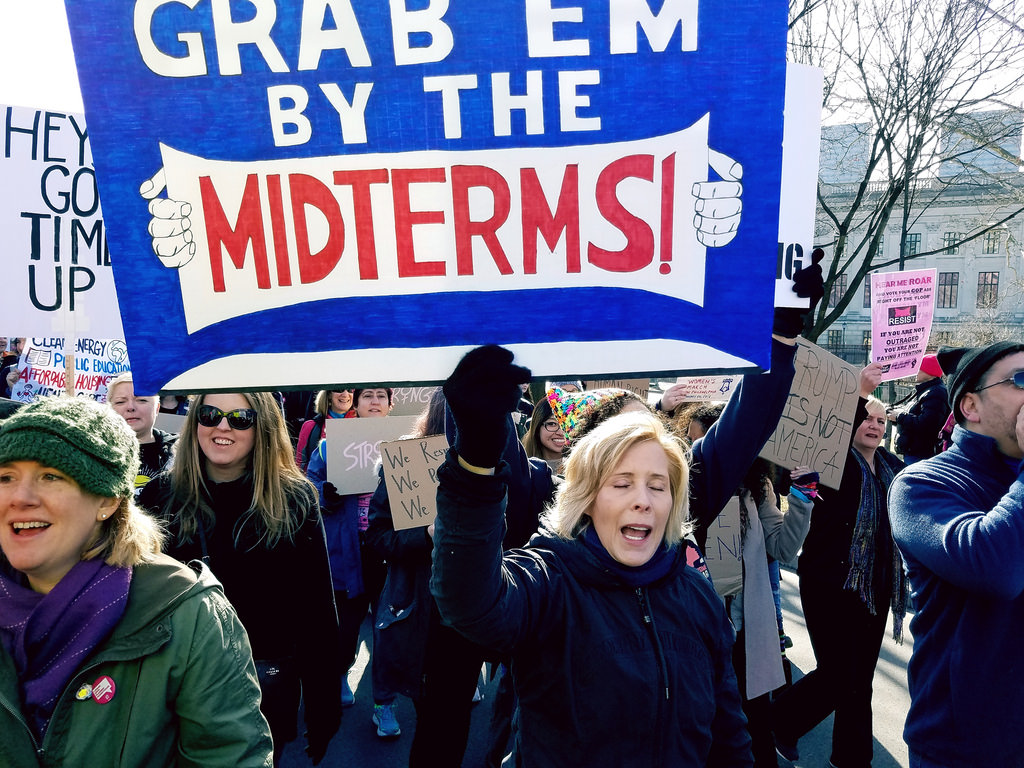The midterm elections have come and gone, and what was once a political side-show marked by comically low voter turnout has been recast as a battle for America’s future, and, crucially, a referendum on the presidency of Donald Trump. Democratic-leaning voters were galvanised by President Trump’s slew of unending scandals, most recently the elevation of hardcore conservative and accused attempted-rapist Brett Kavanaugh to a lifetime appointed to the nation’s highest court. Of course, it’s not just their alleged shared interest in sexual assault that led Trump to nominate Justice Kavanaugh, his view that presidents should be immune from criminal prosecution while in office seems to have done the trick on that front. Then there is Trump’s appalling fear-mongering to his base about a caravan of impoverished migrants fleeing destitution and violence, at the time still 2,000 miles from the border, including an advert that was so plainly racist that even his obsequious cabal of fawning sycophants over at Fox News declined to continue airing it.
In the end, the inflammatory “barbarians at the gates” rhetoric alienated many college-educated suburban voters, to the detriment of Republican candidates in key House races. Democrats swept into a comfortable majority in the House of Representatives, overcoming voter-suppression legislation and unfairly drawn district boundaries that arose from years of Republican gerrymandering. However, as some brainy boffin once observed, “every action has an equal and opposite reaction”. The Kavanaugh allegations encouraged many right-leaning voters to cast their ballots in repudiation of Democratic attempts to use “unfounded” boyhood allegations to derail a man’s career 30+ years after the fact. Likewise, Trump’s race-baiting worked to reinvigorate his base, who turned out in droves to secure key Senate seats and expand the Republican majority in the upper chamber of Congress.
The most obvious consequence of a split congress is legislative deadlock, and in the hyper-polarised world of American politics, this seems unlikely to abate. For what it’s worth, both parties at least tried to pay lip service to the spirit of bipartisanship in the immediate wake of the results. Forced compliments and pledges to “restore the health of our democracy” immediately followed. Unfortunately for the health of US democracy, this cross-party love-in was to last all of about five minutes. The first sign that the bipartisan best buddies club was starting to fracture came when Trump was asked about the Democrats’ absurd proposal that the legislative branch ought to act as a check on the executive, the president responded by threatening to use the Republican senate to investigate senior Democrats. Okay, not the greatest start, but surely nothing to scupper the new special relationship that’s set to heal a badly fractured nation at a time of great need, right? Well, maybe not, but it’s what Trump did next that really put the nail in the coffin, namely firing his Attorney General Jeff Sessions.
So why was Trump so keen to show Sessions the door so soon? To answer this question, one need only look at current news cycle. Remember those midterms that we were talking about a few scandals ago? Neither does CNN. Trump has succeeded in shifting focus away from his party’s poor showing in the House, giving lie to his claim that the midterms were a nigh unqualified success. He can tout the GOP’s minor gains in the Senate all he likes, but it is worth keeping in mind that it was the Democrats defending the majority of the seats up for grabs this year – in 2020, the roles will be reversed. His party also lost seven governorships, enabling Democrats to redraw the boundaries of congressional districts, undoing years of Republican gerrymandering and giving them the edge in key House races. While Trump touts near-total victory, it appears he didn’t learn from his Republican predecessor the dangers of prematurely proclaiming “Mission Accomplished”.
Of course, the most important reason why the sacking of Sessions is significant is the man with whom the president has replaced him. Convention dictates that in such a case, the Deputy Attorney General takes over in an acting capacity, but in case you hadn’t noticed, Trump doesn’t give a fig about what convention dictates. Instead, he took the unusual step in replacing Sessions with his former chief of staff Matthew Whitaker. What could it be that so endeared this man to the president as to secure this most unorthodox (and possibly illegal) promotion? Unlike Kavanaugh, an (alleged) shared penchant for sexual violence doesn’t seem to be a factor. Much like Kavanaugh, however, Whitaker is full-throated supporter of the president being allowed to do whatever he wants whenever he wants to do it. Whitaker had publicly mused that rather than fire Mueller, Trump should simply appoint a new Attorney General to starve his investigation of funds and resources until it is “ground to a halt”. At this latest open attempt to obstruct justice, Pelosi’s so recently conciliatory tone took a sharp turn, proclaiming it “another blatant attempt by [Trump] to undermine and end Special Counsel Mueller’s investigation.” Having said barely enough kind words to each other to deflect immediate charges of obstructionism, it seems both sides are getting ready to dig in their heels for a political and possibly even constitutional dogfight.
Hamza Yusuf
(Image: flickr)

